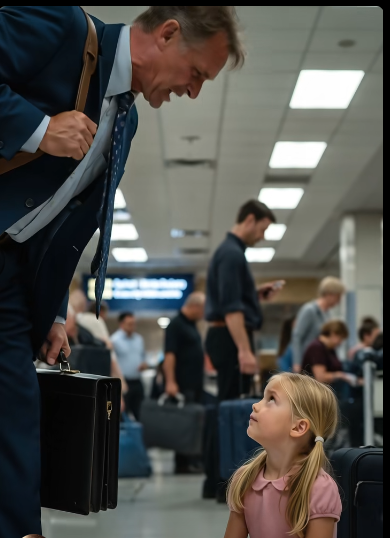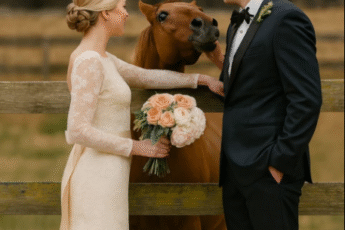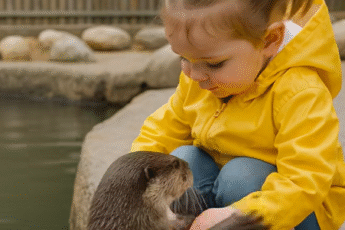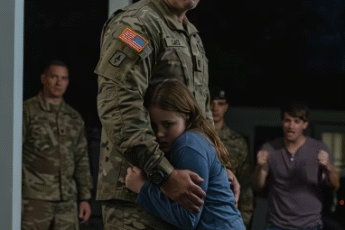Alex woke before his alarm. Outside the window, the world was a canvas of gray, with beads of rain clinging to the glass. Coffee was boiling on the stove. On the table lay his flight tickets, the printout for his business trip, and a shirt, neatly folded by his wife, Elena. He glanced around the kitchen and thought with a familiar irritation that everything was the same as always. Deadlines, phone calls, a suitcase by the door, and a silence in the house that was worse than any noise.
“Alex,” Elena called from the other room. “I warmed up some oatmeal. Have a spoonful, at least.”
“Later!” he shouted back, pulling on his jacket. “I’m late.”
She came out into the hallway and straightened his collar. The movement was practiced and cautious, as if she were afraid to disturb his rare moment of calm. “At least call me when you land,” she asked quietly.
“I’ll call,” he replied, already reaching for the doorknob.
Elena took a breath, as if she were about to say something important, but she stopped herself. He didn’t notice that breath. He grabbed his bag, slammed the door, and habitually skipped two steps as he ran outside. The air was damp and cool. Puddles shimmered underfoot. The taxi was late. He looked at his watch and shrugged his shoulders in annoyance.
The airport was a chaotic sea of people: luggage carts, announcements, someone shouting, “Hurry up!” He clutched his bag, practically running toward the check-in counter, his eyes fixed on the departure board. A single thought consumed him: get there, check the bag, get through security.
As he rounded a corner, he stumbled, a flash of colorful fabric catching his eye. Alex steadied himself on a handrail and turned around. A little girl was sitting on the floor by the wall, with dark, knowing eyes and a long, dark braid. In her hands, she held an old doll with a tattered ribbon, a creature of mismatched patches, worn and thin, but it stared right at him.
He snapped. “Why are you sitting here? Can’t you see people are walking?”
The girl didn’t flinch. She just smiled, a small, knowing smile, and asked quietly, “Your wife bought you that ticket, didn’t she?”
Alex blinked. “What?”
“Return it,” she said calmly. “Go back home. A gift of fate is waiting for you.”
He scoffed and stepped away. A little prophet, he thought. Go home, kid.
The girl just shrugged, as if his decision didn’t concern her, and lowered her gaze to her doll. Alex turned and walked to the counter, but her words—return it, go home, a gift of fate—clung to him, an irritating grain of sand under his eyelid.
The line moved slowly. He pulled out his phone: three missed calls from Elena. The thought to call her back flickered and died. Later. He checked his luggage, went through security, and sat down in a café. The coffee was strong and hot, but he couldn’t taste it. Outside the window, baggage carts crawled across the wet tarmac. An old song played on the radio, one he and Elena had once danced to at a friend’s wedding. A fragment of the chorus surfaced in his memory, and for a second, his heart skipped a beat.
His phone vibrated. “Elena?” He tried to keep his voice even.
“Are you on the plane?” Her voice was quiet.
“Still at the airport. It’s delayed.”
“Alex, I…” she hesitated. “I just wanted to say, have a safe flight. And… Chloe is pregnant.”
He was silent for a few seconds. The words wouldn’t come. “I see,” he finally said. “That’s good news.”
“I thought you’d be happy,” Elena added quietly, then hung up.
He stared at the black screen, as if he could read the rest of the story there. I’m going to be a grandfather, he thought, and a warmth spread through his chest, like opening the door to an old closet and finding a forgotten, cozy blanket.
An announcement crackled over the speakers. The flight was delayed again. Bad weather at the destination. The terminal buzzed with frustrated groans. Alex stood up, pulled the ticket from his pocket, looked at it, then at his watch, then back at the ticket. He made a decision. He walked back to the airline counter.
The young woman behind the desk looked up. “I’d like to return a ticket.”
“Return it?” she asked, surprised. “Reason?”
“Home is waiting,” he said, and suddenly realized that was the truest reason he could give.
She processed the refund. He signed the form, took his passport and his bag, and walked away like a man who had just abruptly changed his path.
The road home was familiar. In the taxi, he looked out the window, seeing the same people, the same bus stops, the same green kiosk that sold bread, but somehow everything seemed brighter, more vivid. As he rode, he remembered how Elena made pancakes on Sundays, how Chloe used to laugh as a child when they built forts out of pillows, how they had argued over the curtains for the kitchen—leaf-patterned or tiny flowers.
His phone vibrated again. It was his daughter’s number. “Dad, Mom’s not feeling well. Her blood pressure spiked, but she’s better now.”
“I’m on my way. I’m coming home.”
“Thank you,” Chloe’s voice was filled with relief.
“I’m close,” he said. “I’ll be there soon.”
Alex went up to his apartment and rang the bell. Elena opened it almost immediately. She was in her robe, the lights on behind her, her eyes tired but clear. “You’re back?”
“I’m back,” he said and pulled her into a hug. “The business trip can manage without me.”
In the kitchen, the kettle was boiling. On the table were two apples and a small dish of honey. Elena set out two cups, silently placing a spoon next to his. He sat down and slowly drank the tea. It was hot, sweet, simple. In that sweetness, there was something from their long-ago evenings.
“I wanted to tell you this morning, but you were in such a hurry,” she said. “Chloe just found out. She was afraid to say anything until she was sure, and then she just couldn’t hold it in.”
“Thank you for telling me,” he smiled. “I’m glad.” It was strange how difficult that word was to say.
“It’s okay,” Elena said.
They sat in a comfortable silence. Alex noticed an old magnet from Lake Tahoe on the refrigerator. He remembered how he and Elena had laughed there, how he’d clumsily rowed the boat, splashing her, and how she’d later dried their towels in the sun while complaining about the mosquitoes.
“Should we go see Chloe tomorrow?” Elena asked.
“Let’s go, and we can look at cribs. If I’m going to be a grandfather, I should start with something useful.”
The night was calm. He could hear Elena’s steady breathing, the ticking of the clock. In that rhythmic sound, there was a sense that everything had finally fallen into place.
In the morning, Elena made thin crepes. The smell filled the apartment, a fragrance from a life long past. Alex helped, holding the plate, catching the crepes as she flipped them, learning as he went. He wasn’t very good at it, but Elena laughed, and her laughter was like music that had been absent from their home for too long.
They went to Chloe’s with a jar of jam and a bag of oranges. Her husband, Andrew, opened the door, his joy genuine. Chloe greeted them in a warm sweater, looking a little overwhelmed, but happy and serious.
“Dad, look,” she said, pulling a pair of tiny socks from a bag. “A friend gave them to me. I think we’re having a boy.”
Alex took the socks in his hands and realized this was the first object of a new life, a life he had no right to miss. “I’ll teach him how to whittle wood,” he said. “My father knew how, so we can figure it out.”
Elena smiled and touched Chloe’s shoulder. Andrew showed them a drawing of a crib he planned to build. Alex looked it over, corrected a few measurements, and suggested a stronger joint. He spoke with a quiet confidence, not with the argumentative tone he usually used. He and Andrew agreed to go get lumber, then head to the workshop where Alex used to spend his time. To his surprise, Alex felt a surge of joy.
After lunch, Elena went to the kitchen and called Chloe in. They whispered about something. Alex sat on the sofa and noticed an old photo album in the corner. He opened it. There were pictures of him when he was young, Elena laughing, Chloe with pigtails. A picture of the table covered in flour because they were baking pies. In one shot, he was holding Chloe’s hand on the bank of a river. The water was murky, the shore littered with driftwood, but her eyes were filled with wonder, as if seeing it for the first time.
“Dad, how are you?” Chloe peeked out from the kitchen.
“Like I’m twenty again,” he smiled.
“Good,” she nodded. “Then we’re on the same path.”
On the way home, Alex was quiet, thinking. His silence wasn’t heavy, but productive. He was making a list: what to buy, who to call, what to change in his schedule, who to delegate tasks to. I was always talking about plans, he thought, but for the most important things, there were no plans. He became more convinced that the plans at home were just as real, and perhaps more important, than the plans at the office.
At home, Alex carried an old workbench out to the balcony, wiped it down, checked that it was level, and hung a bare bulb from the ceiling. The movements were simple, practical, and in each one, there was a sense of, this is how it should be. Elena brought a thermos of tea from the kitchen and set some cookies beside it.
“How are you doing?” she asked.
“Fine,” he nodded.
“Anything I can help with?”
“Measure the height of the crib’s side rail again, please. So it’s not too high, but not too low.”
“Yes, sir, master craftsman,” Elena smiled and carefully placed the measuring tape.
They worked together. He drank his tea in small sips, and every time Elena came out to the balcony, he held his gaze on her a little longer than necessary, as if checking to make sure she was still there, that she hadn’t disappeared.
In the evenings, they started taking short walks around their neighborhood, along the alley past the old poplar tree. They talked about simple things: what kind of bread was best for toasted sandwiches, how to find a good doctor for Elena, where to get a new frying pan. Then they talked about the not-so-simple things—about how their life had taken a turn where they had stopped looking back for each other. Elena spoke little, but now that Alex had stopped rushing her, the words began to come. She told him that a few times she had wanted to leave, to go to her sister’s, but what stopped her wasn’t shame, but the thought that it would be too late to come back. He listened and didn’t make excuses, for the first time in many years.
One evening, they saw the same little girl near the market. She was sitting on the steps with her doll. Alex approached and sat down beside her. “Hello.”
“Hello,” the girl looked at him intently.
“I listened to you then. I returned the ticket.”
“I saw you come back,” she answered. “First with your eyes, then with your heart.”
“Thank you,” Alex said.
“You don’t need to thank me,” the girl shrugged. “I just said what you already knew yourself.”
He took a chocolate bar from his bag and offered it to her. She took it and put it in her pocket. “Everything will be different for you now,” she said, standing up. “But that’s not because of me. It’s because of you.” She walked away, disappearing into the crowd. Alex stood there, watching her go, and thought that sometimes fate speaks with a stranger’s voice, just so a person can finally hear their own.
Elena took his arm, and they continued their walk.
A few days later, Elena’s blood pressure spiked dangerously. Her hand went to her forehead, her vision darkened. Alex didn’t panic. He called the clinic, found the on-call doctor, got her pills, laid her down, and measured her pressure again. His voice was calm, his movements gentle. He didn’t pace back and forth, didn’t curse fate, didn’t blame the weather. He acted. After an injection and some warm tea, Elena felt better. She looked at him with a gaze that held everything: gratitude, exhaustion, affection, and something else, something that used to have another name: trust.
“Were you scared?” she asked.
“I was,” he answered honestly. “But I’m here.”
“Thank you,” Elena said.
Alex called Chloe, told her everything was under control, and asked her not to worry. Then he sat beside Elena, holding her hand until she fell asleep, thinking about how simple and how important it was to be home. Not because someone told him to, but because he understood it himself.
He started leaving work earlier. His conversations with his boss were short. “I’ll get everything done on time, but after six, I have things to do at home.” His colleagues were surprised. “Alex has changed,” they’d say, adding, “for the better.” He stopped taking on other people’s emergencies, stopped rushing those he used to hurry, stopped putting off what couldn’t wait: conversations at home.
One evening, he brought out the old photo albums. He and Elena sat on the sofa and opened them. The pages rustled. In the photos, a crowd of relatives in a cramped kitchen, crumbs on the table, laughter in their eyes.
“Remember how we renovated the kitchen?” Elena said. “It took us three days, and then for a month, we couldn’t figure out where the hammer went.”
“And it was behind the radiator,” Alex smiled. “We spent half a day looking, half a day laughing.”
“That was a good time,” Elena said.
“A good time is just beginning,” he replied.
With each passing day, the house filled with more ordinary things that suddenly gained weight. A call from Chloe asking to buy baby cream. The sound of a screw being turned just right. A metal spoon clinking against the side of a cup as Alex poured tea for Elena. A note on the refrigerator: 10 AM, doctor’s appointment. Don’t forget the insurance card.
They went to a baby store, chose a mattress, bought a small pillow. Elena took a long time, touching each fabric with her fingertips, and on her face, Alex saw not indecision, but the pleasure of the task. At home, they put everything away neatly. Alex placed a small, rabbit-shaped nightlight on the windowsill. That evening, it cast a soft glow.
“It’s beautiful,” Elena said.
“It’s quiet,” Alex added.
“You’ve changed,” she said suddenly. “Not on the outside. Inside.”
“I came back,” he answered simply.
One evening, he brought home a cake for no reason. Elena was surprised but accepted it. “What’s this for?” she smiled.
“For the fact that today is an ordinary day,” he said. “And ordinary days are worth celebrating.” They cut the cake, eating small pieces, listening to someone next door trying to play the piano. The notes were hesitant, but you could hear the effort. Alex thought that their life was much the same: not perfect, but every day was an honest effort.
Then began the small trips to the clinic, the tests, the prescriptions, the schedule of visits. Alex sat with Elena in the waiting room, held her purse, stood up to give his seat to the elderly. He didn’t do it for show, without grand gestures.
When they returned home, Alex opened his laptop and wrote a short email to his boss. Regarding business trips, please coordinate in advance. Home is the priority. I promise to complete tasks on time. He didn’t wait for an immediate reply. He didn’t need approval. He needed his own internal checkmark. Finally.
And so they lived. Simple days, filled with warm soup and quiet conversation. Once a week, Alex drove to his daughter and son-in-law’s house, helping however he could. Chloe sent an ultrasound photo. On the black-and-white image, a tiny miracle with a mosquito-sized hand, barely visible, but understandable. Alex looked at the picture for a long time and placed it on the shelf where the most important things were kept: keys, tickets to a play they hadn’t been to in a long time, two old seashells from the ocean.
This was how their new life was built. Not from big holidays, but from what was at hand. There were no grand promises. There was only: “I’ll buy it,” “We’ll install it,” “I’ll call the doctor,” “We’ll go to Chloe’s,” “I’ll stay home.” These words replaced the big phrases and did what should have been done all along.
Sometime later, Alex ran into his boss in the hallway. “Alex, we have a trip next week, but it’s a short one. Can you handle two days?”
“If it’s two days, I can handle it,” Alex said. “I’ll be back after lunch. I have something important at home. I promised.”
“You promised. Do it,” his boss said unexpectedly. “I haven’t seen you like this before. You’re a sharp guy. You were just always buried in other people’s tasks.”
Alex nodded, thinking that something in him had also been recognized.
Sometimes he returned to the thought of the little girl, to what she had said. In her “return it and go home,” there was no command. There was just a calm, steady suggestion: Do what you’ve long decided to do but haven’t dared. And he was glad he did.
One day, as he and Elena were coming back from the market, Elena stopped at a shop window and looked at a pair of baby booties. “We used to buy ones like these,” she said.
“We didn’t buy them, you knitted them,” Alex corrected her. “They came out crooked, but with a lot of heart.”
“That’s because you chose the wrong kind of wool,” she retorted.
They laughed as they walked, like two people who could afford to argue without anger.
That night, Alex got up and went out onto the balcony. The sky was clear. From deep within the building, he could hear voices. Someone was discussing fish; someone was singing. He stood there and thought that people always have things that seem more important than their loved ones, and that the most important things are often quiet and unnoticed. And that it’s not shameful to return. It’s shameful not to make it in time.
Elena came up behind him and put her arms around him. “You’ll get cold,” she said.
“No,” he replied, holding her tighter. “Don’t stay out in the cold. Let’s go to bed.”
“Let’s go.”
In the morning, he went to work and called Elena from the doorway. “I’m here.”
“Have a good day,” she wished him.
“You too.”
Those two short sentences made his day better than all the hot coffee in the world combined.
At lunch, he suddenly remembered: I need to buy pear jam. Elena loves it. He bought it. That evening, he put it on the table. She was surprised, shaking her head, smiling.
“It’s a small thing,” he said.
“But it’s pleasant and true,” she answered.
Chloe sent the first video of the baby kicking, where you couldn’t understand anything, but you could feel everything. Alex passed the phone to Elena. She cried and then immediately laughed.
“A gift of fate,” she said.
“A gift of fate,” he repeated, and realized how perfectly that sounded.
One quiet evening, he dreamt again of the airport corridor and his own hurried back, and he heard a voice say calmly, “Return the ticket, go home.” He woke up, looked at Elena, at the nightlight, at the neatly folded sweater on the chair, at their shared table, and thought, I’m back.
This thought required no confirmation. It was enough to go to the kitchen, put the kettle on, slice the bread, open the jam, and feel, in the silence, how the house breathed with him. And how in that breath, you could hear the most important thing: that you are near, that you were not too late.
Sometimes fate speaks loudly, sometimes it whispers. That day, it spoke with a strange child’s voice in an airport hallway: “Return it, go home.” And Alex did a simple thing: he listened and found himself where he was awaited. Where the gift of fate was not gold or random luck, but a warm hand on the table and quiet laughter in the kitchen. And that turned out to be more important than any business trip, any bonus, any victory in endless arguments, because the new locks in their life were now placed not on doors, but on words they used to throw around without thinking. And the keys to those locks were held by both of them.






